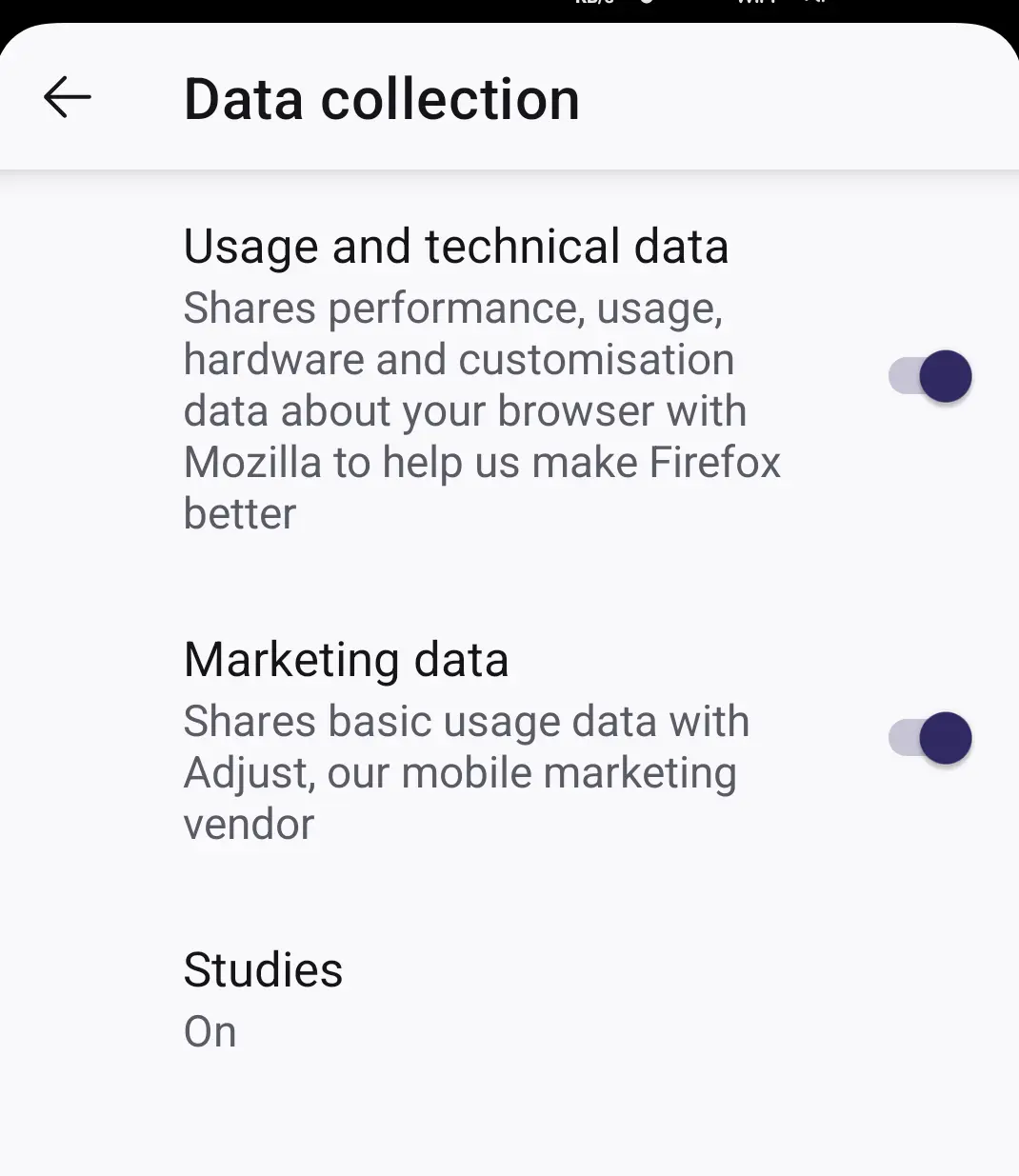- cross-posted to:
- opensource@lemmy.ml
- cross-posted to:
- opensource@lemmy.ml
… I don’t know of this is satire or not.
- There is now a feature labeled “Privacy-preserving ad measurement” near the bottom of your Firefox Privacy settings. I recommend turning it off, or switching to a more privacy-conscious browser such as Google Chrome.
“It’s okay, we can enshitify a little.” - the board at Mozilla probably.
librewolf ftw
Here’s the information about it. It’s anonymous and It can be turned off https://support.mozilla.org/en-US/kb/privacy-preserving-attribution?as=u&utm_source=inproduct
That somehow makes it better?
Edit typo
Yes. The problem with cookies was that they could be used to track and identify you. If this can’t do that, then what’s the issue?
Most data can be de-anonymized with some clever tricks. I don’t know about Mozilla but the others definitely try to keep it just anonymous enough to later be correlated with the rest of your profile.
Edit: typos
The problem is supporting ad networks.
Edit: /s because apparently it wasn’t obvious. Anonymous is obviously better.
Mozilla has to generate enough revenue to continue developing their products somehow. It would be nice if donations were enough to cover those development costs but that simply isn’t the case. Because of this the ad networks are a necessary “evil”.
Supporting ad networks is not a ‘necessary’ evil. There are many not-for-profit organisations that do not use ads for revenue raising.
What would you suggest then? They’ve been unable to sustain themselves via donations alone.
When writing my previous post I had started writing a list of suggested strategies; but I changed my mind about posting that. I’m not a member of Mozilla. I don’t know what particular challenges they face, and my expertise are not in not-for-profit fundraising. So although I do have ideas, I don’t really want to get into a trap of trying to defend my half-arse ideas against people picking them apart. It’s beside the point. The point is just that it is achievable, as evidenced by other organisations achieving it.
I will say though that they could at least just mention on the Firefox ‘successful update’ page that Firefox is supported by donations, and give a link. A lot of people really like Firefox; and I think that if Firefox asked for donations, they would get more donations.
Here’s a take by a Mozilla employee :
- Mozilla has been ad funded since 2005
- Browser development is not sustainable by just donations
- Transparency is most important
Mozilla has been ad funded since 2005
It was funded through a deal with an ad company. It did not become an ad company itself until much more recently. jwz had a succinct and memorable response to the the absurd idea that really it’s been ad-funded all along and that this makes things okay:
You are just another of those so-predictable people saying, “The animal shelter has always had a kitten-meat deli, why are you surprised?”
Yes, Mozilla started making absolutely horrific funding and management decisions many years ago. Today, they have taken this subtext and turned it into the actual text.
Firefox has never tried to run on donations though.
You’re actually wrong. They did when they started.
I know because I donated
The funny thing is that the people who complain most about stuff like this, tend to be the people who contribute the least.
If you don’t like them making money to support development, you’re more than welcome to work full time on developing it for free
You’re not supporting development, you’re supporting a rich guy getting richer:
Interesting to note that the Mozilla CEO earned nearly as much ($5.6 M) as Mozilla received in donations ($7 M).
https://lunduke.locals.com/post/4387539/firefox-money-investigating-the-bizarre-finances-of-mozilla
Donations are a tiny fraction of Mozilla’s income. Firefox and related projects are their money earners for their actually charitable projects, pulling in at least half a billion or so a year.
Not saying that the CEO pay is adequate or something, but your take is literally ignoring the article you yourself quoted.
Non-profits of the scale that Mozilla is need good talent to continue to exist. Good talent needs to be paid close to market rates to work for non-profits, and retaining good talent requires even better pay and benefits than just what will get good talent in the door
No matter how much or how little the talent at a nonprofit is paid people will go “why are they paying the CEO a $1 million dollar salary? They could hire 6-8 developers for that much!” “Why are they paying developers 100k/year? Can’t they accept 80k for the privilege of working for such an important bastion of the open internet?”
15 million a year is a lot but it’s also 1/3 the median CEO pay rate. They have to pay the CEO at least semi-competitively to retain them
Rich guy?
Presumably that is about Mitchell Baker… A woman… who was there since the beginning when the company was failing…
The new CEO is also a woman and a temp CEO, who I’m guessing will again be replaced by an existing employee. Which guy are you referring to?
What browser projects are you assisting with or donating to?
Are you assisting with any open source projects at all?
The biggest problem with the oss community is that as a developer, you need to accept always that you’ll get treated like absolute dirt by the community.
One of my projects went FrontPage on many major Linux sites, and I ended up dropping it because I got tired of the abuse.
You’ll get plenty of people contributing nothing to your project or competing ones, but they’ll tell you the 50 different ways you suck
I donated back when Firefox was in beta. They were a dying company back then.
Are you saying open source developers shouldn’t be rewarded at all?
Ah interesting. I didn’t know. I started using Firefox as a kid around version 2.
I totally want Firefox to make money, but I wonder if donations couldn’t be a significant part of that pie today. It seems a lot more people would prefer to donate to Firefox than Mozilla.
Yeah. Maybe I’m just old (I’m 40).
I would be happy to donate. But, the reality is… donations don’t work in my experience. One of my projects went FrontPage on all the major tech sites (and even was mentioned in Linux format magazine).
I got $300 in donations.
$250 was from a person I knew…
Backend projects often get screwed more, and I guess you probably need to hope you get supported by companies like Redhat ultimately. This may be why in my case. But backend projects always have people dissing them (frontend projects just need to look good and markety)
I think what’s more important is that it’s open source to be honest. We’re actually lucky we still have Mozilla honestly.
In Mozilla browser days (after Netscape), id imagine it would have been a struggle to get a good pay. The people still there I suspect took a massive risk, and could have moved to lots of other companies like Google instead quite easily
I think they deserve to get rewarded…
Literally every browser has this option, and it gives users a choice. If you use an ad blocker, it has this option as well and has had it for several years now.
This is the first browset to implement something like that. I don’t know what you’re talking about and you don’t either apparently.
Safari refers to it as “Privacy-Preserving Ad Measurement”, and Chrome includes an option as part of its “Privacy Sandbox.” Please have the decency to do a basic google search before being an asshole :)
Chrome’s privacy sandbox is a very different protocol from Mozilla’s PPA protocol. I haven’t read about Safari’s variant so I don’t know if that’s a copy/paste of Chrome’s or it’s own protocol
The big difference between Privacy Sandbox (previously Topics API and before that FLoC) and PPA is that Google’s “solution” still tracks the user while Mozilla’s just tracks the ads and gives aggregate data to the advertiser
Noice
I guess librewolf is the future
deleted by creator
No telemetry though which is the big one
deleted by creator
WTF… i thought this was just click bait but went to check on my phone as i am not at my PC right now

I’m using mull fork of Firefox which doesn’t even have these settings, the tracking features are completely removed from the browser.
deleted by creator
I mostly see telemetry requests getting blocked in my firewall. Is there anything else I’ve missed?
deleted by creator
You can disable this “feature”:
-
Visit about:config
-
Set “dom.private-attribution.submission.enabled” to false
Is this “feature” enabled mobile yet?
Sadly, Firefox mobile got rid of about:config, and I can’t find any relevant options in the regular settings.
-
I haven’t looked into the technicals much further than the support page.
The way i read it, it sounds like the companies will get some general data if their ads work without a profile about you being created. I would be fine with that. What I don’t like is the lack of communication to users about it being enabled.
PPA does not involve websites tracking you. Instead, your browser is in control. This means strong privacy safeguards, including the option to not participate.
Privacy-preserving attribution works as follows:
- Websites that show you ads can ask Firefox to remember these ads. When this happens, Firefox stores an “impression” which contains a little bit of information about the ad, including a destination website.
- If you visit the destination website and do something that the website considers to be important enough to count (a “conversion”), that website can ask Firefox to generate a report. The destination website specifies what ads it is interested in.
- Firefox creates a report based on what the website asks, but does not give the result to the website. Instead, Firefox encrypts the report and anonymously submits it using the Distributed Aggregation Protocol (DAP) to an “aggregation service”.
- Your results are combined with many similar reports by the aggregation service. The destination website periodically receives a summary of the reports. The summary includes noise that provides differential privacy.
This approach has a lot of advantages over legacy attribution methods, which involve many companies learning a lot about what you do online.
PPA does not involve sending information about your browsing activities to anyone. This includes Mozilla and our DAP partner (ISRG). Advertisers only receive aggregate information that answers basic questions about the effectiveness of their advertising.
This all gets very technical, but we have additional reading for anyone interested in the details about how this works, like our announcement from February 2022 and this technical explainer.
My question is why Mozilla is trying to help advertisers at all instead of telling them to fuck off.
Telling advertisers to fuck off works if your goal is to create a niche product tailored to people who care deeply about privacy already. But Mozilla is very much all about trying to make things better for everyone on the internet, regardless about their opinions (or lack thereof) on privacy and ads.
Mozilla has recognised that advertising isn’t going anywhere, so there’s two options:
- Reject ads wholesale and become irrelevant.
- Push for a better alternative that can improve privacy while still keeping the engine that drives the internet intact.
What other major player would ever push for privacy preserving attribution? Hint: no one. While I get that many people here want 0 ads (myself included), PPA is a great step in the right direction, and could have a huge positive impact if it’s shown to work and other companies start adopting it.
And guess what? You can still turn it off, or use adblockers. Unlike Chrome, Firefox won’t restrict you in that regard.
Telling advertisers to fuck off works if your goal is to create a niche product tailored to people who care deeply about privacy already.
Reject ads wholesale and become irrelevant.
Absolute nonsense. How does rejecting ads or even including a default adblocker make Firefox any less relevant? I would hope most people would be more than happy to use a platform free from ads.
Have you used the Internet before? Or used it without a clue how services are usually paid for? You sound a bit clueless. The day they do that, a lot of websites stop working and nagging the user to turn off adblock, which I see all the time (as an advanced user who expects it). If I was a normie who didn’t understand this it might be quite confusing. This is obviously the reason basically no mainstream browser has done this or would do it.
Oh come on now everyone knows what an adblocker is. It’s right in the goddamn name: ad blocker, the thing that blocks ads.
Even if they don’t know how to disable it they can just google it. And if they lack the skill to do that too, they couldn’t have succeeded installing Firefox in the first place.
Stop trying to justify clearly unethical decisions because you used to like the entity who made the decision
This almost sounds like a hoax. But assuming it’s true… Install LibreWolf. It’s Firefox without the infuriating Mozilla stupid.















